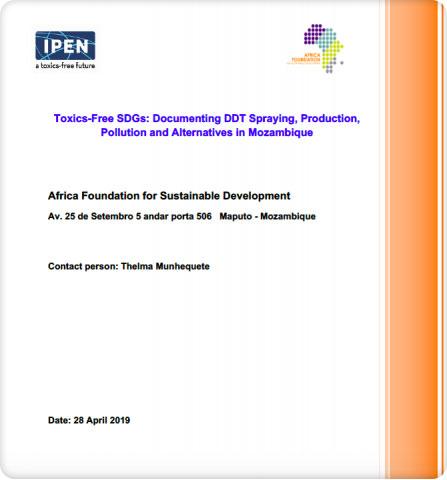Documenting DDT Spraying, Production, Pollution and Alternatives in Mozambique

The overall objective of this project was to reveal the ongoing proliferation of DDT pollution in manufacturing and use and cite important non-chemical alternatives to increase pressure for acting on this ongoing use in Mozambique, one of the countries that have registered an acceptable purpose for DDT use within the Stockholm Convention. Africa Foundation for Sustainable Development (AFSD) carried out this project through literature review, field visits, and interviews with policy makers, amongst other activities. At the culmination of the project, AFSD also provided recommendations for the government:
- Identify and empower key target groups including women, children and workers with adequate knowledge, positive attitudes, skills and techniques to address issues of POPs, in particular DDT, and alternatives;
- Lobby and advocate for involvement of all potential partners in awareness campaigns including NGOs, CSOs, the private sector, religious institutions, research and training institutions and mass media, among others;
- Train active, local community-based organizations and other stakeholders and players at the commuity level on community monitoring and documentation of chemcial incidents, information exchange, dissemination and networking;
- Develop awareness-raising materials, communication messages related to POPs (especially DDT), and translations of key informaiton materials into local languages and disseminate them through appropriate channels; and
- Carry out periodic monitoring and evaluation of the malaria control programs.
This project relates to Sustainable Development Goals 2, 3, 6, 8, 12, 13, 14 and 15.
Special thanks to IPEN's Anglophone Africa Regional Coordinator Silvani Mng'anya and IPEN"s Anglophone Africa Regional Hub AGENDA for their important contributions to the development and finalization of the project.
| Attachment | Size |
|---|---|
| 3.09 MB |
